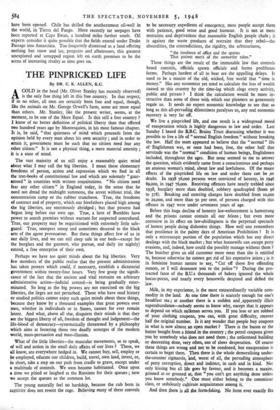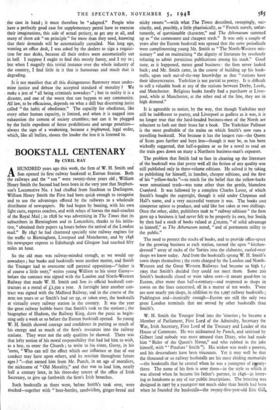THE PINPRICKED LIFE
By DR. C. K. ALLEN, K.C.
ACOLD in the head (Mr. Oliver Stanley has recently observed) is the only free thing left in this free country. In that- respect, if in no other, all men are certainly born free and equal, though, like the animals on Mr. George Orwell's farm, some are more equal than others. Mr. Stanley, like the present writer, seems, at the moment, to be one of the More Equal. Is this still a free country ? I know of no better definition of political liberty than that offered two hundred years ago by Montesquieu, in his most famous chapter. It is, he said, " that quietness of mind which proceeds from the opinion held by every man about his own security ; and in order to attain it, government must be such that no citizen need fear any other citizen." It is not a physical thing, a mere material amenity ; it is a state of mind.
The vast majority of us still enjoy a reasonably quiet mind about what I may call the big liberties. I mean those elementary freedoms of person, action and expression which we find in all the text-books of constitutional law and which are solemnly " guar- anteed" in countries with written constitutions. " No citizen need fear any other citizen " in England today, in the sense that he need not dread the midnight summons, the arrest without trial, the concentration camp or the rubber truncheon. True, the freedoms of contract and of property, which our forefathers placed high among the big liberties, are enormously abridged ; but that process had begun long before our own age. True, a host of Bumbles have power to search premises without warrant for suspected contraband. True, our property may be requisitioned with extremely little safe- guard. True, snoopers snoop and sometimes descend to the black arts of the agent provocateur. But these things affect few of us in our daily lives, and we can still sleep safe in our beds—except for the burglars and the gunmen, who pursue, and daily (or nightly) extend, a free enterprise of their own.
Perhaps we have too quiet minds about the big liberties. Very few members of the public realise that the present administration has taken powers which could, if necessary, establish a dictatorial government within twenty-four hours. Very few grasp the signifi- cance of the fact that the ancient and vital restraint on arbitrary administrative action—judicial control—is being gradually exter- minated. So long as the big powers are not exercised on the big liberties, the lieges are not perturbed. Those who have read history or studied politics cannot enjoy such quiet minds about these things, because they know by a thousand examples that great powers over men, whether in individuals or in States, cannot for ever remain latent. And what, above all else, disquiets their minds is that they see the biggest. liberty of all, freedom of thought and judgement—the life-blood of democracy—systematically threatened by a philosophy which aims at fostering those two deadly scourges of the modern world, mass-persuasion and mass-illusion.
What of the little liberties—the muscular movements, so to speak, of will and action in the small daily affairs of our lives ? These, we all know, are everywhere hedged in. We cannot buy, sell, employ or be employed, educate our children, build, travel, own land, invest, or, in short, take a step on our path from cradle to grave, except under a multitude of controls. We soon become habituated. Once upon a time we pitied or laughed at the Russians for their queues ; now we accept the queues as the common lot.
The young naturally feel no hardship, because the cub born in captivity does not resent the cage. Believing many of these controls to be necessary expedients of emergency, most people accept them with patience, good sense and good humour. It is not at mere restraints and deprivations that reasonable English people chafe ; it is against the waste products of restraint that they rebel—the absurdities, the contradictions, the rigidity, the arbitrariness, " the insolence of office and the spurns That patient merit of the unworthy takes."
These things are the result of the immutable law that controls breed controls, officials spawn officials and forms proliferate forms. Perhaps hardest of all to bear are the appalling delays. It used to be a maxim of the old, wicked, free world that " time is money." Has any economist yet tried to calculate the loss of wealth caused to this country by the time-lag which clogs every activity, public and private ? I think the calculation would be more in- structive than some of those with which our planners so generously regale us. It needs no expert economic knowledge to see that so long as this all-pervading dilatoriness paralyses us, any real economic recovery is very far off.
We live a pinpricked life, and one result is a widespread mood of exasperation which is highly dangerous to law and order. Last Sunday I heard the R.R.C. Brains Trust discussing whether it was possible to live a life a "normal English freedom" without breaking the law. Half the team appeared to believe that the "normal " life of- Englishmen was, or once had been, free, the other half that servitude was the "normal " condition of human beings, Englishmen included, throughout the ages. But none seemed to me to answer the question, which evidently came from a conscientious and perhaps an anxious woman's mind, about law and lawfulness. Of the major effects of the pinpricked life on law and order there can be no doubt. In 1938 56,00ci persons were convicted of larceny, in 1946 69,000, in 1947 76,000. Receiving offences have nearly trebled since 1938, burglary more than doubled, robbery quadrupled (from 96 to 378). Breaking and entering charges have doubled from io,000 to zo,000, and more than so per cent. of persons charged with this offence in 1947 were under seventeen years of age.
Before this huge decline of honesty law-enforcement is hamstrung and the prisons cannot contain all our felons ; but even more corrosive in its effect on law-abidingness is the perpetual spectacle of honest people doing dishonst things. How well one remembers that pestilence in the palmy days of American Prohibition ! It is only a microscopic portion of the population which has any direct dealings with the black market ; but what housewife can escape petty evasions, and, indeed, how could she possibly manage without them ? The butcher gives an old customer more meat than she is entitled to, because otherwise he cannot get rid of his expensive joints ; is it in feminine human nature to say, " Cut off those five offending ounces, or I will denounce you to the police "? During the pro- tracted farce of the B.U.s thousands of bakers ignored the whole hocus-pocus, and nearly every housewife despised and defied the law.
Milk, in my experience, is the most extraordinarily variable com- modity in the land. At one time there is scarcely enough for one's breakfast tea ; at another there is a sudden and apparently illicit superabundance—nobody seems to know why, except thatit appears to depend on which milkman serves you. If you lose or are robbed of your clothing coupons, you can, with great difficulty, recover half the original number. Is it any wonder that people buy coupons in what is now almost an open market ? There is the bacon or the butter bought from a friend in the country ; the petrol coupons given you by somebody who does not need them ; the unlicensed building or decorating done, very often, out of sheer desperation. Of course these things are wrong and not to be condoned, but exasperation is certain to beget them. Then there is the whole demoralising under- the-counter rigmarole, and, worst of all, the pervading atmosphere of petty corruption, direct and indirect, in cash and in kind. Not only kissing but all life goes by favour, and it becomes a maxim. grinned at .or groaned at, that " you can't get anything done unless you know somebody." One must either belong to the commissar class, or sedulously cultivate acquaintance among it.
And then there is all the form-faking. No form ever exactly fits. the case in hand ; it must therefore be " adapted." People who have a perfectly good case for supplementary petrol have to exercise their imaginations, this side of actual perjury, to get any at all, and many of them ask " on principle " for more than they need, knowing that their demands will be automatically curtailed. Not long ago, wanting an office desk, I was asked by the dealers to sign a requisi- tion for two desks, because all their orders were automatically cut in half. I suppose I ought to find this merely funny, and I try to ; but when I magnify this trivial instance over the whole industry of the country, I find little in it that is humorous and much that is degrading.
Is it not manifest that all this disingenuous flummery must under- mine justice and debase the accepted standard of morality ? We make a jest of " all being criminals nowadays " ; but in reality it is a disaster, and one of the worst that can happen to any community. All law, to be efficacious, depends on what a dull but discerning jurist called '" the habit of obedience." The capacity for obedience, like every other human capacity, is limited, and when it is nagged into exhaustion the cement of society crumbles; •nor can it be plugged by the futile expedient of fierce prohibitions and savage penalties-- always the sign of a weakening, because a frightened, legal order, which, like all bullies, shouts the louder the less it is listened to.











































 Previous page
Previous page